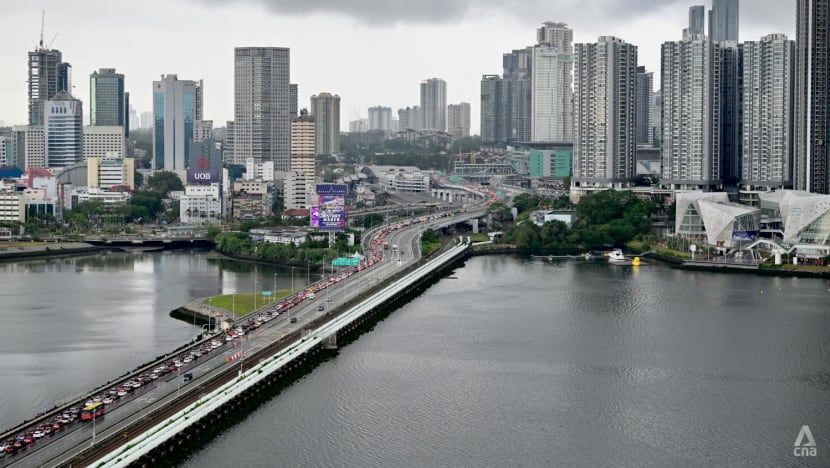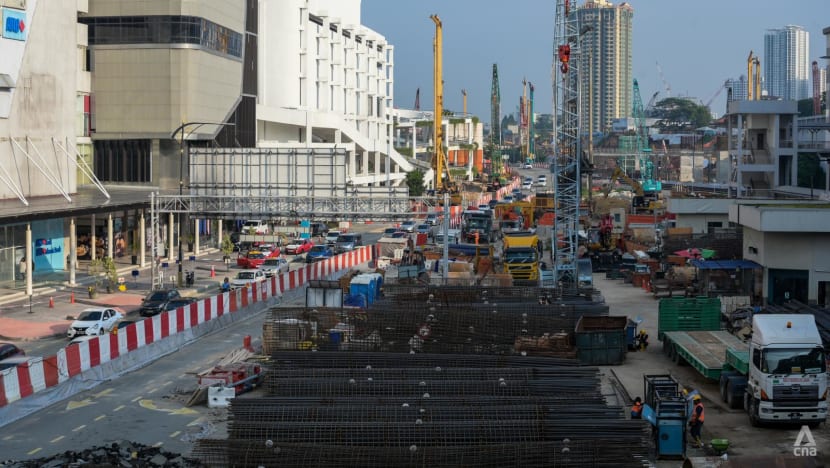‘Happy to do the bare minimum’: Fears rising that Johor’s brain drain has worsened its work culture
In this second of a two-parter on Johor’s manpower challenges, CNA examines the perception that its workforce comprises mostly those seeking a good life - locals unmotivated at seeking better-paying jobs elsewhere and those returning after years working overseas.

Heavy traffic passing through the Woodlands Causeway leading to Johor Bahru. (Photo: CNA/Hanidah Amin)
JOHOR BAHRU: Legal clerk Salina Hassim, 42, has lived and worked her whole life in her hometown of Johor Bahru.
The mother of three has had family members and friends trying “many times” to persuade her to follow them in seeking job opportunities in Singapore, where salaries are two to three times what they are in Johor.
However, Madam Salina, who declined to reveal her income details, has rebuffed them because she believes she knows what her priorities in life are.
“If I work in Singapore, how am I going to take care of my kids? What time will I come home every day to see my kids?,” she told CNA.

“Many of my friends work in Singapore. Even my elder brother works in Singapore. Yes, they have big cars compared to us over here and yes, I feel left out, but I feel like they want all those things for themselves and I don’t.
In recent months, however, a weaker Malaysian ringgit compared to the Singapore dollar has reportedly led to more Johoreans seeking jobs in Singapore, and also cast the spotlight on the workforce left behind in Johor.
In a recent media report on how more are leaving Johor for work elsewhere, Mr Yong Wa Kong, deputy president of the Johor Bahru Coffee, Restaurant and Bar Merchants Association, said those who stay behind in the state are those who do not have high expectations for life”.
“To them, a salary of RM2,000 (S$586) or RM3,000 is good enough,” Mr Yong told the Malaysian Insight.
He also said a handful of workers are returning to Johor, thinking “they have made enough money and want to go home”.
“Because they have been away for over a decade, working day and night far from their families, they now want a stable life and time to spend with their families,” added Mr Yong.
DECLINING WORKING CULTURE IN JOHOR?
The brain drain in Johor to Singapore has drawn concern from industry observers over the southern state’s workforce and how it has lowered the standards of working culture.
Johor Bahru Cooks Association president John Ang told CNA that many Johoreans who remain in the state are not motivated by a desire to do better in their career, and this is pervasive throughout the different industries.
“The reality is that many workers in Johor are happy to just do the bare minimum. It’s very rare that employers find workers who go that extra mile,” said Mr Ang.
“My worry is that if this doesn’t change, the productivity in Johor will remain low and economically, we will lose out and become less relevant,” he added.
Another who feels this way is Mr Low Kueck Shin, the president of Johor Bahru Chinese Chamber of Commerce and Industry (JBCCI), who believes the brain drain has led to declining standards of working culture in Johor.
“Over the years, we have seen more and more Johoreans heading across the border to Singapore for work. There is the perception that those who remain behind are not motivated to work, they just want to cruise through life,” said Mr Low.
“This is not true for everyone, but the reality is the working culture in Johor is slower and more relaxed than in Singapore,” he added.
Mr Low, who heads a palm oil company, told CNA that he would prefer to hire foreign labour than locals because they are “more hardworking”.
“More than half of our staff are foreign labour. They are unskilled but they work hard,” said Mr Low.
Ms Emelia Dewi Md Syam, who was born in Johor, spent eight years working in the retail sector in Singapore.

The 39-year-old Malaysian commuted daily via bus from her home in Johor Bahru for work between 2011 and 2019. For two years prior to that, she worked in retail in Johor Bahru.
However, just before the COVID-19 pandemic, she quit her job as she felt stressed by the workload and daily travel. She now lives in Bangi, Selangor and is working freelancing gigs.
She told CNA that even though she resigned from her Singapore job due to stress, she does not wish to work in Johor Bahru.
“I’ve heard from friends, the working culture is bad. There's a high attrition rate because workers leave when they get offers from Singapore, so the rest are overworked,” said Ms Emilia Dewi.
When asked if she could have stayed longer in her work in Singapore, Ms Emilia Dewi said she doesn't regret moving back.
“I’m closer to my family now. It was worth it to try it out but I'm happier with this slower pace of life,” she added.
A nurse, who wanted to be quoted only as Ms Rani, is a Johorean who is currently working and living in Singapore.
She previously worked in a public hospital in Johor, and she claimed that nurses then were treated like “slave labour”.
“We would work back-to-back shifts because of the manpower shortage and there would be no rest during the shift. We are also not asked to go for courses to upgrade ourselves like in Singapore,” said Ms Rani.
Legal clerk Madam Salina acknowledged that Johor may be suffering from a talent brain drain - where its most skilled workers have been lured to Singapore for better wages, leaving a manpower vacuum in the southern state.
She added that some Johoreans also hold themselves back in upskilling because the easy option would be to cross the border and work gig jobs.
“Most times many of these Johoreans who cross the border did not finish their studies or university because they are able to get a good salary working odd jobs like being waiters and janitors in Singapore,” added Mdm Salina.
“I think when they come back to be with family, they realise they have wasted the opportunity to upgrade themselves and have a fulfilling career,” she said, citing how a friend of hers had turned down the opportunity to study law to work as a driver across the Causeway.
STEMMING THE TIDE
Mr Thomas Mathew, chief executive of the Talent Corporation Malaysia (TalentCorp), a government agency under the Ministry of Human Resources tasked to reduce the extent of brain drain nationally, told CNA that Malaysia has a disproportionately large portion of its population working overseas.
Citing world migration data released by the United Nations, Mr Mathew said that 5.6 per cent of Malaysia’s population, or around 1.6 million, were based overseas, compared to the global average of 3.6 per cent.

“But when you cut it and dissect it further, you'll realise that 60 per cent of Malaysians abroad are in Singapore," said Mr Mathew.
He said that TalentCorp has focused its efforts on pulling back talent from Singapore via the Returning Expert Programme.
The programme includes the Malaysia@Heart initiative, which offers incentives for skilled Malaysians who wish to return from abroad.
These incentives include an optimal 15 per cent flat tax rate on chargeable employment income for five consecutive years as well as granting PR status to foreign spouses and children who are eligible, subject to the approval and discretion of the Malaysia Immigration Department.
However, according to data released by TalentCorp, only 17 per cent of those who have successfully returned to Malaysia via REP were from Singapore. This is a small proportion given that six out of ten Malaysians based overseas are in Singapore.
“We are happy with what we are achieving (but) when you look at the total population based overseas, naturally this is never sufficient,” said Mr Mathew.
However, Mr Mathew remains optimistic that most Malaysians based abroad would one day come back to serve the economy due to the emotional attachment and national identity many of them have.
“Our study shows that 85 per cent of Malaysians based overseas want to return back to Malaysia at some point in time,” he said.
CREATING MORE SKILLED JOBS
To attract more skilled workers to return home or locals to stay back and pick up better skills and better jobs, the Malaysia federal government is keen to attract more investments to Johor, which will boost the number of skilled jobs available for the workforce.
According to figures from the Department of Statistics Malaysia (DOSM), out of a working population of 15.39 million people in 2022 nationally, 29.6 per cent of them are categorised as skilled while 12 per cent are low-skilled. More than half - 58.4 per cent were under the semi-skilled category.
Deputy Minister of Trade, Investment and Industry Liew Chin Tong told CNA that the country’s economy has been dependent on skilled foreign labour “for the longest time” and that local workers, including those in Johor, have struggled for higher skilled positions.
“We play in the low-cost and low productivity sphere, and this hasn’t changed,” he said, adding that the New Industrial Master Plan 2030 plans to boost the number of high-paying manufacturing jobs in Johor over the next seven years.
He highlighted that the number of jobs in the manufacturing sectors is expected to increase to 3.3 million by 2030 at a compound annual growth rate of 2.3 per cent, with a significant number of them in Johor.
Furthermore, he added that the median wage for the manufacturing sector is expected to increase nationally from RM1,976 in 2021 to RM4,510 by 2030.
“At some point we could help industry upgrade their technology, automate to use less labour and therefore pushing up manufacturing wages,” said Mr Liew, who is also chief of the Johor chapter for the Democratic Action Party.
Mr Liew said that Johor, with its abundant land and good industrial infrastructure, is well placed to lead the way by persuading companies to rely less on skilled foreign labour, and more on technology and automation.
“If we can actually push up the manufacturing wages substantially, this will provide a sizable number of skilled jobs for Malaysians to consider.
“Those who are already in Singapore, it is not easy for them to come back. But those who have not left yet if they find that jobs in Malaysia pay, they will reconsider.”
MALAYSIA SEEKS COLLABORATION, NOT COMPETITION, WITH SINGAPORE
To overcome the talent brain drain in Johor, the Malaysia government is seeking to collaborate, rather than compete, with Singapore, a point that TalentCorp chief Mr Mathew agreed with.
He said that both countries should work together, instead of trying to pinch talents from one another.
He cited one way to do this was the recent announcement of a new Johor-Singapore Special Economic Zone (SEZ), which could boost job opportunities for young local Johoreans without having to cross the Causeway.
The governments of both countries had agreed to set up a task force to study a possible SEZ following the 16th meeting of the Malaysia-Singapore Joint Ministerial Committee for Iskandar Malaysia (JMCIM) in July.
In a release then, the committee said the Johor-Singapore SEZ would build on the foundation set by the various work groups to drive sustainable growth, develop human capital, and improve infrastructure and connectivity.
On Sep 14, Johor chief minister Onn Hafiz Ghazi said that Malaysia Prime Minister Anwar Ibrahim would be discussing the terms of reference (TOR) of the proposed SEZ with his Singapore counterpart Lee Hsien Loong during their upcoming Leaders' Retreat in October.
"I think that is probably the way to go, and then you'll probably find some sort of balance with respect to wages between the two countries," said Mr Mathew.
Deputy minister Liew also outlined that firms in Singapore need a hinterland and production site, and that Johor is well-positioned to provide these.

"So say your company set up a regional hub in Singapore. The managers now want to see their factory line, not too far away, maybe within two hours’ journey," said Mr Liew.
He added that Johor’s proximity to Singapore, and cheap land as well as good infrastructure would make it a suitable option for these businesses.
Both Mr Liew and Mr Mathew are confident that Johor may also benefit in the human talent sphere from Singapore's rising costs of living, especially in the housing sector.
"At some point in time, it's going to be so expensive to stay in Singapore. Malaysians will say it is just not worth it for me to stay in Singapore for work," said Mr Mathew.
Mr Liew said the improved connectivity between both countries from the Rapid Transit System project, which is scheduled to be operating from end 2026 linking Bukit Chagar in Johor Bahru city to Woodlands in Singapore, could also help in retaining Johor’s talents.
But he also urged both countries to do more to boost accessibility, like operating three more ferry lines from Pasir Gudang to Changi or from Puteri Harbour to Tuas or from Forest City to Tuas or Jurong.
In August, Mr Anwar announced that Forest City would be redesignated as a special financial zone, offering tax incentives and fast entry of workers from Singapore.
Mr Liew said that Johor working together with Singapore would be a win-win for both sides.
"So we are in a new era where there is a lot of investment coming into the region and if both Singapore and Malaysia can raise our game … I envisage that in the years to come the Malaysian economy will be able to pay its workers a lot better,” he said.
















